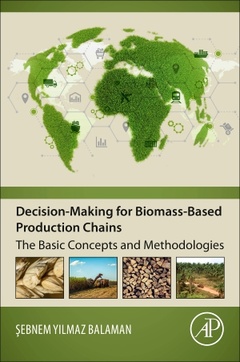Decision-Making for Biomass-Based Production Chains The Basic Concepts and Methodologies
Auteur : Balaman Sebnem Yilmaz

Decision-Making for Biomass-Based Production Chains: The Basic Concepts and Medothologies presents a comprehensive study of key-issues surrounding the integration of strategic, tactical and operational decision levels for supply chains in the biomass, biofuels and biorefining sectors. Comprehensive sections cover biomass resources, harvesting, collection, storage and distribution systems, along with the necessary technical and technological background of production systems. In addition, the basics of decision-making, problems and decision levels encountered in design, management and operation phases are covered. Case studies are supplied in each chapter, along with a discussion and comparative analysis of topics.
The book presents a clear vision of advances in the field. Graduate students and those starting in this line of research will also find the necessary information on how to model this kind of complex system. Finally, this comprehensive resource can be used as a guide for non-expert industry decision-makers and government policymakers who need a thorough overview on the industry.
1. Introduction to biomass – resources, production, harvesting, collection and storage 2. Biomass based production systems 3. Biomass based supply chains and logistics networks 4. Sustainability issues in biomass based production chains 5. Uncertainty issues in biomass based production chains 6. Basics of decision making in design and management of biomass based production chains 7. Modelling and optimization approaches in design and management of biomass based production chains
Engineering researchers and practitioners in the biomass, biofuels and biorefining fields, especially those without an industrial engineering background. Graduate students in areas of energy systems, renewable energy, bioenergy, biomass and sustainable design. Managers, specialists and consultants in biomass, biorefinery and bioenergy sectors. Project developers in on-site biomass and bioenergy feasibility projects.
- Examines analytic methodologies for complex decision-making when designing, deploying and managing biomass and bio-based products supply chains
- Includes real-life examples of main sustainability indicators, standards and certification schemes from the European Union, United States and worldwide
- Explores the progress of decision-making procedures to provide a detailed perspective for effective selection of the most reliable solutions for each kind of problem
- Provides detailed, in-depth analyses of various models and frameworks for their implementation, challenges and solutions
- Presents multi-criteria and multi-objective decision-making and modeling approaches, including mathematical modeling, simulation-based modeling, and artificial intelligence-based modeling
Date de parution : 10-2018
Ouvrage de 258 p.
15x22.8 cm
Thème de Decision-Making for Biomass-Based Production Chains :
Mots-clés :
Bio-chemical conversion; Bio-product consumption; Biomass certification; Biomass conversion systems; Biomass logistics; Biomass sources; Biomass transportation; Biomass-based supply chains; Energy crops; Extraction; Heuristic approaches; Life cycle assessment; Mathematical programming; Methods to handle uncertainty; Modeling and optimization approaches; Multiple attribute decision-making; Multiple objective decision-making; Operational decisions; Residues; Simulation; Solution methods and tools



